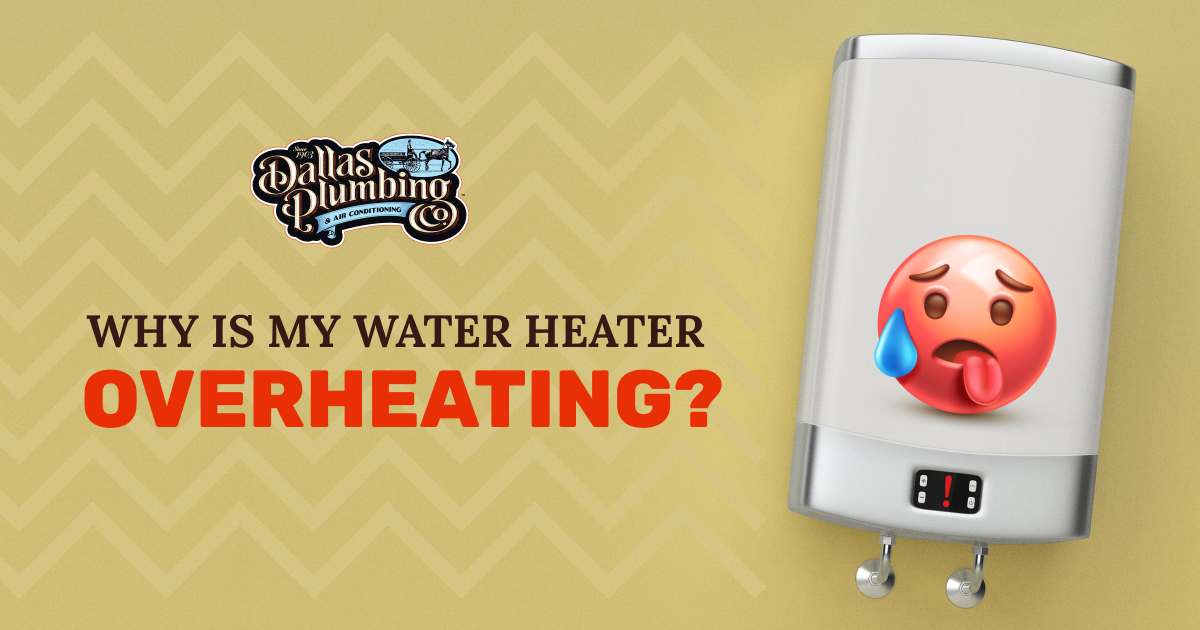An overheating water heater isn’t pleasant or safe, especially when you’re simply trying to wash your hands or shower in peace. The signs of an overheating water heater include overly-heated water coming out of water fixtures, crackling noises, or a leaking pressure relief valve. These issues are all serious, but knowing their origin is the key to fixing any issue. As the leading Dallas Plumbing & Air Conditioning repair team, we are here to resolve the problem of your water heater overheating.
Reasons for an Overheating Boiler
There are many issues from an overheating water heater. First, the overly high temperatures can wreak havoc on the boiler itself, reducing its lifespan and creating the need for many unnecessary repairs. Then, there’s the issue of safety which only expands if you have small children or infants in the house who can become severely injured. Thus, if you think your boiler is getting too hot, we urge you to investigate the issue as quickly as possible. This problem can be the result of the following causes:
Thermostat Setting
One of the first culprits of an overheating boiler is the thermostat setting. Luckily, you don’t need Dallas Plumbing & Air Conditioning repair service techs on hand to fix this issue. Look at the thermostat setting on the unit. If the temperature is set too high, you must reduce it. The recommended temperature range for water heaters is 120 to 140 degrees Fahrenheit.
Malfunctioning Thermostat
Sometimes the thermostat may be showing one temperature but delivering something different. This is caused by a malfunctioning thermostat, which will have to be investigated and repaired by a professional plumber.
Sediment Buildup
An overly high accumulation of sediment inside the unit can also lead to its overheating. Sediment coats the heating element and creates a natural insulation, which increases its temperatures. For this reason, it is important that a water heater is periodically flushed out in order to keep the sediment to a minimum.
Here is a quick breakdown of the steps you should take to flush your water heater by yourself:
- Turn off the power and water supply to the water heater.
- Connect your garden hose to the drain valve at the bottom of the unit. Place the second end of the hose outside or in a drain.
- Open the drain valve and allow the water to flow out completely or until it runs clear of all sediment.
- You may need to scoop out and clean any remaining sediment on the very bottom of the unit if it doesn’t flow out with the rest of the water.
- Disconnect the water hose and close the drain valve.
- Turn the water and power back on, allowing all of the water to flow back into the water heater.
- Give the unit about 1 hour to heat up the water, and you’re ready to enjoy your water heater once more.
If this process seems too complicated, do not hesitate to reach out to a plumber in your area for assistance.
Faulty Pressure Relief Valve
The water heater is a system that works with water, an energy source, and a perfect balance of pressure. If either of these elements are malfunctioning, the entire unit will suffer. The pressure relief valve is designed to release the perfect amount of pressure, which keeps the boiler’s temperatures at a perfect equilibrium. If this valve is malfunctioning, it won’t release the pressure as required and this will lead to an overheating water heater.
Electrical Issues
Dallas Plumbing & Air Conditioning repair service techs often run into electrical issues within the boiler, which will cause the heating element to suffer. These issues range between faulty wiring or even short-circuiting, which will hurt the way the water heater performs.
Insufficient Ventilation
Water heaters need proper ventilation to release heat. If the surrounding area is poorly ventilated or obstructed, it can cause the unit to overheat. Poor ventilation and excess pressure inside the unit can lead to bursting, which is a big problem you want to avoid.
High Water Pressure
There may also be a problem if the pressure of the water entering the water heater is too high. This will cause the water to heat up more than necessary, leading to those excessively high temperatures. This problem isn’t easy to pinpoint and it is better to have a plumber on hand to help you fix it.
Leading Dallas Plumbing & Air Conditioning Repair Services
Are you experiencing challenges with your water heater? If so, call Dallas Plumbing & Air Conditioning today. With over 120 years in business, diagnosing and repairing such issues is second nature to us. You can trust that our techs will be quick to resolve your water heater problems.






